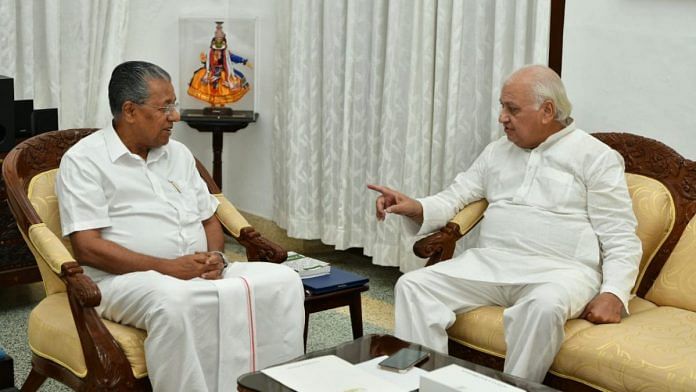New Delhi: Governor Arif Mohammed Khan continues to sit over crucial bills cleared by the Kerala assembly despite being briefed on them, once by the chief minister and then by the ministers-in-charge of the bills, the Pinarayi Vijayan-led LDF government has said.
In an additional affidavit filed in the Supreme Court, Kerala chief secretary V. Venu claimed that the chief minister, the law minister and the higher education and co-operation minister met the governor personally to explain the changes proposed in the bills. This, it said, was done after Khan wrote to Vijayan asking him that either he or the minister in charge of the bill should personally brief him.
Five months have elapsed since the last meeting and the governor has still not acted in accordance with Article 200 of the Constitution, according to the affidavit, which is part of the Kerala government’s petition seeking a direction to the Raj Bhavan to clear the pending bills.
A bench led by Chief Justice D.Y. Chandrachud Monday issued notice to the Centre and gave it as well as the governor four days to respond.
The bills pending in the Raj Bhavan are The Kerala Industrial Single Window Clearance Boards and Industrial Township Area Development (Amendment) Bill, 2022; The Kerala Public Enterprise (Selection & Recruitment) Board Bill, 2022; The Kerala Lokayukta (Amendment) Bill 2022; The Kerala Co-operative Societies (Second Amendment) Bill, 2022; The University Laws Amendment Bill, 2021 (1st and 2nd) and The University Laws (Amendment) Bill, 2022.
The details of communication between the Governor’s office and the CMO between August 2022 and June 2023 on the bills were placed before the Supreme Court through the additional affidavit.
ThePrint has accessed a copy of the affidavit that gives an insight into the causes of ensuing face-off between the Kerala governor and the government.
In a letter to Venu on 8 August, 2022, Khan took objection to the action of sending 11 bills to his office without a briefing. He also recalled his suggestion that “in the backdrop of the absence of a periodical and proper system of briefing” him on government affairs, he would like to have briefing by the minister in-charge or any other ministry that has dealt with the bill.
Eleven days later, the governor’s office conveyed to the chief secretary that whenever a minister desired to call upon the governor, he/she “may be accompanied by the secretary to the government or the concerned department instead of a private secretary to the minister”.
Subsequently, the animal husbandry minister along with her private secretary, a senior government functionary, met the governor. This prompted the governor’s office to issue instructions to bar the minister’s personal staff from entering the Raj Bhavan.
Khan again sought information on 11 bills in a letter on 19 September to the CM, saying there should be periodical and proper briefing on government matters. “Neglect on the above-mentioned request has become an impediment in the exercise of my function,” his letter noted.
A response from the CM the next day urged the governor to mention the points on which clarification was sought so that the ministers can “effectively brief” him. It maintained that the CM and the ministers have always “briefed” the governor in the past whenever it was required.
Thereafter, the governor was quick to seek a meeting with the ministers, even as he cleared five of the 11 bills awaiting his assent.
Kerala’s affidavit points out that the two ministers who piloted the pending bills sought appointment from the governor. Though a time was allotted on 22 October, 2022, they could not meet Khan as he was travelling on that day.
When there was no communication from the Raj Bhavan, the chief minister called upon the governor in January 2023 and handed over a representation to clear the bills.
This letter clarified that the bills awaiting the governor’s nod were neither repugnant to any prevailing central legislation or any provision which derogates from the power of the high court. As per the Constitution, the two grounds are the only causes for a governor to hold back or refer a state bill to the President.
Yet, the governor wrote to the CM in February 2023, saying he was waiting for the state to act upon his assurance given in September 2022 on being briefed. The ministers met the governor in February and June.
Even after the correspondence and meeting, the affidavit mentioned, the governor made public statements that he would not give assent to the University Laws Amendment Bill.
This bill relates to the appointment of chancellor of universities in Kerala and replaces the governor as chancellor with an academician of “high repute or a person of eminence”. It proposes that the chancellor will be selected by a three-member selection panel comprising the CM, the Leader of the Opposition and the Speaker of the House.
(Edited by Tony Rai)
Also Read: Empowering state to appoint V-Cs, inspect universities — pending bills in TN govt vs governor tussle



